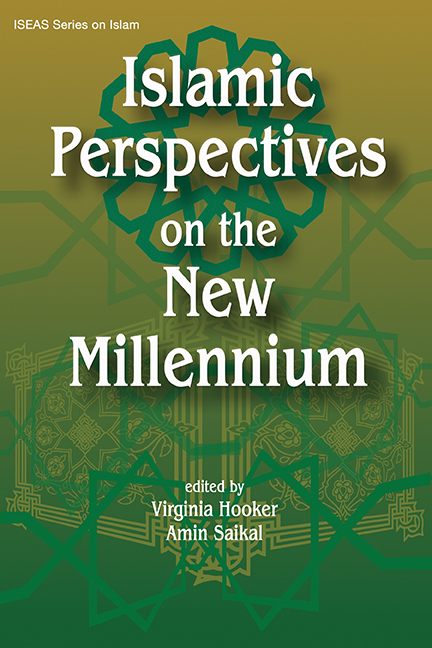Book contents
- Frontmatter
- Contents
- Acknowledgements
- Contributors
- 1 Islamic Perspectives on the New Millennium
- The New World Order
- The New Age
- The Economy
- The Nation-State
- Muslim Women
- Law and Knowledge
- Conclusion
- 14 Developing Islamic Arguments for Change through “Liberal Islam”
- Glossary
- Index of Names
- Index of Subjects
14 - Developing Islamic Arguments for Change through “Liberal Islam”
from Conclusion
Published online by Cambridge University Press: 21 October 2015
- Frontmatter
- Contents
- Acknowledgements
- Contributors
- 1 Islamic Perspectives on the New Millennium
- The New World Order
- The New Age
- The Economy
- The Nation-State
- Muslim Women
- Law and Knowledge
- Conclusion
- 14 Developing Islamic Arguments for Change through “Liberal Islam”
- Glossary
- Index of Names
- Index of Subjects
Summary
Preserve the fire of Islam not its ashes! Discover the fire of Islam!
(President Sukarno, 1958)The last decade of the twentieth century saw the publication of many writings by Muslims who argued that extremists were causing violence not only to people but also to the basic precepts of Islam. In 1997 for example, Bassam Tibi, well-known analyst of contemporary Islam, concluded the Preface to his book The Challenge of Fundamentalism, with the sentences: “As the ‘open society’ has its enemies, to use the phrase of Sir Karl Popper, so too does an ‘open Islam’ have its enemies: the fundamentalists. They are a challenge not only to world order but also to us liberal Muslims”. Tibi's response to “the burgeoning global phenomenon of religious fundamentalism” is “a compact based on secular democracy and human rights”. If this were to become the basis for “an international cross-cultural morality”, he argues, different civilizations and cultures might be brought together into more peaceful forms of coexistence.
The last chapter of Tibi's study canvasses the possibility that human rights might become the means of establishing “a cross-cultural international morality” which could be shared by individuals in Muslim and Western civilizations. In reaching this position, Tibi acknowledges the “inspiring” discussions he enjoyed in Jakarta with Indonesian Muslim intellectuals. That experience led him to believe that “Southeast Asian Muslims offer us some hope for easing the desperate situation of Islamic civilization and the disintegrating order of the world at the turn of the new century”. Tibi uses the term “liberal Muslims” and he singles out Southeast Asia, in particular Indonesia, as the region which might produce ideas for cross-cultural understanding, which could underpin a new sense of morality for all mankind. His optimism is the starting point for this final chapter which will encompass many of the themes of the previous chapters but present them through the eyes of a recently formed group of “liberal Muslims” in Indonesia.
- Type
- Chapter
- Information
- Islamic Perspectives on the New Millennium , pp. 231 - 252Publisher: ISEAS–Yusof Ishak InstitutePrint publication year: 2004

